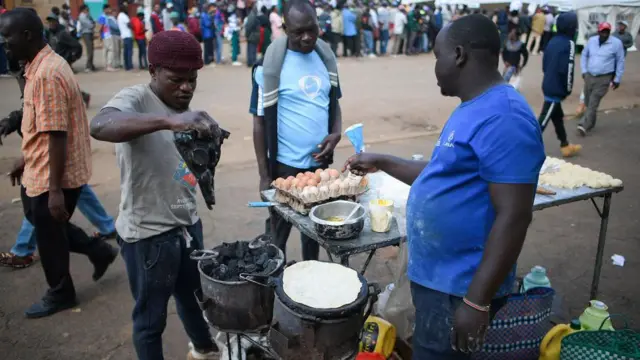By Basillioh Rukanga, BBC News, Nairobi – 12 hours ago
Kenya’s President William Ruto is a man of many nicknames—El Chapo, Kasongo, Hustler, Deputy Jesus, and Chicken Seller are just some of the monikers he has acquired in recent years.
As is often the case with Kenyan politics, some nicknames are affectionate, others mocking, and several reflect deeper frustrations among citizens.
Ruto himself acknowledged the trend, joking recently that Kenyans are “finishing” him with the countless labels.
“You’ve given me so many names… Will you stop at 10, or should I prepare for more?” he asked at a rally in Nairobi. The crowd responded enthusiastically, suggesting they had even more lined up.

Nicknames That Helped His Rise
Before becoming president in 2022, Ruto embraced the nickname Hustler, a term rooted in Kenyan slang for someone striving to survive. It connected him to the people and helped him build a strong grassroots base. Another early label, Chicken Seller, referred to his childhood selling poultry—an origin story that endeared him to many voters.
“These were very positive [names]. They sold him to the public in terms of votes,” said political analyst Prof Herman Manyora in an interview with the BBC. “Names really stick with Ruto,” he added.
Controversial Legacy and Changing Sentiment
But Ruto has long been a controversial figure. One enduring name, Arap Mashamba (son of farms), emerged over a decade ago due to questions surrounding his extensive land holdings. In 2013, a court ordered Ruto to surrender a 100-acre farm after a land-grabbing case tied to Kenya’s 2007 post-election violence.
Nicknames like Deputy Jesus and Nabii (prophet) came from his frequent use of biblical verses. However, since his rise to the presidency, the names have become more critical and satirical.
Zakayo and the Tax Backlash
The most resonant nickname now is Zakayo—Swahili for Zaccheaus, a biblical tax collector. Many Kenyans feel betrayed by the government’s push for unpopular taxes that disproportionately affect the lower and middle class.
In 2024, youth-led protests erupted across Nairobi in response to new tax hikes. The demonstrations turned deadly and were only halted after the proposal was shelved. The chant “Ruto must go” became common—and now “Must Go” is yet another nickname.
The Satirical Explosion Online

Social media has intensified nickname culture. Ruto’s frequent travel led to the label Vasco da Ganya—a twist on explorer Vasco da Gama and the Swahili word danganya (to lie). His taste in fashion and questions about truthfulness earned him the name Kaunda Uongoman, a pun on Congolese artist Kanda Bongo Man and uongo (lies).
Some satire has crossed lines, according to officials. AI-generated images, including one showing the president in a casket, have been denounced as “distasteful.” Activists allege abductions tied to political memes, raising concerns over freedom of expression in Kenya.
Public Reaction and Catharsis
Government spokesman Isaac Mwaura downplayed the phenomenon, saying the nicknames simply reflect how the public views the president. “It’s normal for any leader to have many nicknames,” he said, citing efforts to reduce the budget deficit and stabilize the economy.
Yet, the response from young Kenyans tells another story. Lachon Kiplimo, 23, said the nickname El Chapo emerged after Ruto promised a machine to make one million chapatis a day—a pledge seen as unrealistic. Chapatis, known as chapo, are a staple food, and the nickname reflects growing skepticism.
“He’s strong, sure—but he hasn’t delivered,” Kiplimo admitted.
Margaret Wairimu Kahura, 24, sees the mockery as a form of catharsis. “Many Kenyans are in pain. The names are a way to tell the president how we feel.”
More Nicknames Than Any Predecessor
Ruto has more nicknames than any Kenyan president before him. Previous leaders had some, like Kamwana (Uhuru Kenyatta), General Kiguoya (Mwai Kibaki), or Jayden, but none with such volume or variety.
The rise of social media fuels this trend, as users seek fresh, funny, and biting ways to express their frustrations—and hopes. For now, President Ruto wears these nicknames like armor, embracing the satire while forging ahead with reforms.









